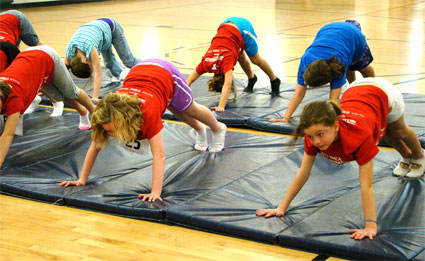Chubby babies are cute and cuddly. People cannot resist babies with fat cheeks and dimpled knees. People assume that a thin child is weak, sickly and unhealthy. However, there may come a time when the extra fat loses its charm. And chubby babies become fat children. Not every chubby baby grows into a chubby adult. For the most part, children begin to lose their baby fat as they move towards adolescence. Other babies just never seem to outgrow their chubbiness. But the reason why some babies tend towards obesity as they grow up is not easily explainable. Heredity plays a key role in determining the general frame of a childs body. That is why tall parents generally have tall children. Thus, if the family is generally stocky and big-framed, there is a chance that the child will be overweight. The same principles apply to obese adults and children. Placid children who prefer to loll around daydreaming are more likely to be overweight than their more active counterparts. Lack of exercise means the child fails to burn off extra fat. In addition, there are some children who just love to eat. They are born with a love for food. They have impressive appetites that seem unaffected by sickness or nervousness. They are usually more than pleasantly plump by the time they are two to three months old. They seem inexorably drawn towards rich and fattening foods like chocolates, pastries, fried foods and aerated drinks. Like adults, children can also fall into a bad habit of deriving comfort from food. Shy, unhappy or lonely children who find it difficult to break the ice with other children often seek solace in food. The more they eat, the fatter they become. This, in turn, lowers their chances of being accepted by other children. Children can be awfully cruel and a fat child is often the butt of jokes. In addition, fat children may not find it easy to participate in the games that other children play which isolates them even more. The more awkward these children are about taking part in games and other activities, the more they foster the development of fat in their bodies. Obesity should be nipped in the bud before the situation spins out of control. If you feel that your child is a little glutton with a taste for all the wrong foods, and if she is inordinately fat before she is a year old, cut down on the starch and fat in her diet. Try to satisfy her appetite with more proteins, fruits and vegetables. However, there is no need for parents to go overboard worrying over baby fat. They will transmit this paranoia to the child who will feel that she is unattractive and that the only way to win peoples approval is by being thin. This is exactly what every parent should avoid. The last thing you want is to sow the seeds of an eating disorder like anorexia or bulimia in the mind of your child. The child should never be made to feel that her self-esteem is linked to her physical appearance. Remember that most children lose that puppy fat with the arrival of puberty. Most parents do not have the heart to put their child on a diet even if that is what the doctor prescribes. These parents feel that dietary restrictions are not associated with young children. Adults themselves find it difficult to stick to a diet, so they cannot expect a child to exercise that kind of will power. If you fear that your child is heading towards obesity, consult a doctor. He will in all probability advise a diet. Try to incorporate this diet into the meals for the rest of the family without much fuss. The child will feel a sense of solidarity if the whole family follows the same diet. Sometimes children are more amenable to listening to advice from doctors. Thus, it may help if the doctor had a chat to explain the diet and the reasoning behind it. Minimal counselling may provide psychiatric assistance to your little one.
Chubby babies are cute and cuddly. People cannot resist babies with fat cheeks and dimpled knees. People assume that a thin child is weak, sickly and unhealthy. However, there may come a time when the extra fat loses its charm. And chubby babies become fat children.
Not every chubby baby grows into a chubby adult. For the most part, children begin to lose their 'baby fat' as they move towards adolescence. Other babies just never seem to outgrow their chubbiness. But the reason why some babies tend towards obesity as they grow up is not easily explainable.
Heredity plays a key role in determining the general frame of a child's body. That is why tall parents generally have tall children. Thus, if the family is generally stocky and big-framed, there is a chance that the child will be overweight. The same principles apply to obese adults and children. Placid children who prefer to loll around daydreaming are more likely to be overweight than their more active counterparts. Lack of exercise means the child fails to burn off extra fat. In addition, there are some children who just love to eat. They are born with a love for food. They have impressive appetites that seem unaffected by sickness or nervousness. They are usually more than pleasantly plump by the time they are two to three months old. They seem inexorably drawn towards rich and fattening foods like chocolates, pastries, fried foods and aerated drinks.
Like adults, children can also fall into a bad habit of deriving comfort from food. Shy, unhappy or lonely children who find it difficult to break the ice with other children often seek solace in food. The more they eat, the fatter they become. This, in turn, lowers their chances of being accepted by other children. Children can be awfully cruel and a fat child is often the butt of jokes. In addition, fat children may not find it easy to participate in the games that other children play which isolates them even more. The more awkward these children are about taking part in games and other activities, the more they foster the development of fat in their bodies.
Obesity should be nipped in the bud before the situation spins out of control. If you feel that your child is a little glutton with a taste for all the 'wrong' foods, and if she is inordinately fat before she is a year old, cut down on the starch and fat in her diet. Try to satisfy her appetite with more proteins, fruits and vegetables.
However, there is no need for parents to go overboard worrying over baby fat. They will transmit this paranoia to the child who will feel that she is unattractive and that the only way to win people's approval is by being thin. This is exactly what every parent should avoid. The last thing you want is to sow the seeds of an eating disorder like anorexia or bulimia in the mind of your child. The child should never be made to feel that her self-esteem is linked to her physical appearance. Remember that most children lose that 'puppy fat' with the arrival of puberty.
Most parents do not have the heart to put their child on a diet even if that is what the doctor prescribes. These parents feel that dietary restrictions are not associated with young children. Adults themselves find it difficult to stick to a diet, so they cannot expect a child to exercise that kind of will power.
If you fear that your child is heading towards obesity, consult a doctor. He will in all probability advise a diet. Try to incorporate this diet into the meals for the rest of the family without much fuss. The child will feel a sense of solidarity if the whole family follows the same diet. Sometimes children are more amenable to listening to advice from doctors. Thus, it may help if the doctor had a chat to explain the diet and the reasoning behind it. Minimal counselling may provide psychiatric assistance to your little one.





























